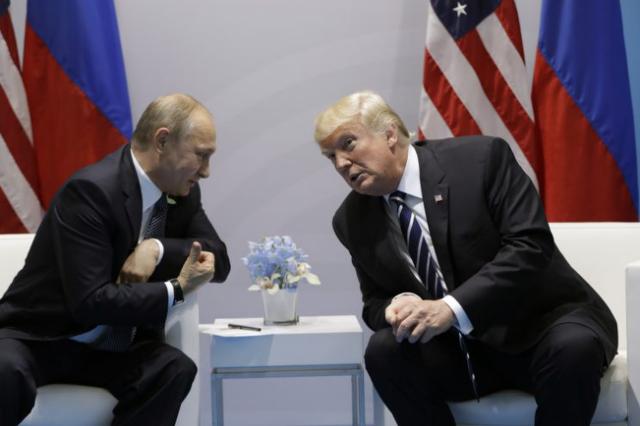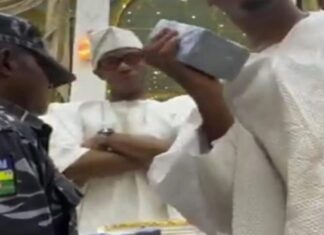President Trump and Russian President Vladimir Putin met Friday on the sidelines of a major economic summit in Germany, their first face-to-face encounter since U.S. intelligence formally accused Moscow of meddling in the 2016 election. Trump did not answer shouted questions from reporters about whether he would raise the matter with the former KGB spymaster.
Instead, the two leaders shared a handshake, smiles and small talk as they sat down in Hamburg amid the G-20 summit.
“President Putin and I have been discussing various things, and I think it’s going very well,” Trump told reporters, according to a pool report from the Washington Post.
Officials on both sides had described the meeting as a get-to-know-you session without an ironclad agenda, but the leaders were expected to discuss such weighty issues as the campaign against the so-called Islamic State in Syria. On Thursday, Secretary of State Rex Tillerson said Washington was prepared to cooperate with Moscow on a range of issues in that war-ravaged country. Putin’s military has helped prop up strongman Bashar Assad, whose regime, the U.S. says, stands as an obstacle to peace.

In Hamburg, Trump did not specifically cite Syria but said, “We look forward to a lot of very positive things happening for Russia, and for the United States and for everybody concerned. And it’s an honor to be with you.”
Speaking through a translator, Putin declared that he was “delighted to be able to meet you personally” and that he hoped for “positive results” from the discussion.
“Phone conversations are never enough, definitely,” the Russian leader said. “If you want to have a positive outcome in bilaterals and be able to resolve most international policy issues, that will really need personal meetings.”
The two presidents ignored shouted questions about whether Trump would raise the issue of alleged Russian interference in the 2016 election. As reporters were ushered out, Trump leaned in to Putin and said something to Putin, who chuckled.
The light tone of their public remarks contrasted with Trump’s tougher language a day earlier in a speech in Warsaw.
“Today, the West is also confronted by the powers that seek to test our will, undermine our confidence and challenge our interests. To meet new forms of aggression, including propaganda, financial crimes and cyberwarfare, we must adapt our alliance to compete effectively in new ways and on all new battlefields,” Trump declared.
“We urge Russia to cease its destabilizing activities in Ukraine and elsewhere, and its support for hostile regimes — including Syria and Iran — and to instead join the community of responsible nations in our fight against common enemies and in defense of civilization itself,” he added.
In a briefing last week for reporters, Gen. H.R. McMaster, Trump’s national security adviser, and Gary Cohn, Trump’s top economic aide, declined to say whether the president would raise the issue of Russian efforts to influence last year’s political contest.
“There’s no specific agenda,” McMaster said. “We don’t have an agenda set up,” Cohn agreed, adding that the White House was “still finalizing schedules.”
Asked what Trump hoped Putin would do to build trust between Washington and Moscow, McMaster declined to list specific actions.
“Our relationship with Russia is not different from any other country in terms of us communicating to them what our concerns are, where we see problems in the relationship but also opportunities,” the general said.
At the same time, McMaster said, Trump has tasked his top aides to find ways to “confront Russia’s destabilizing behavior,” including “political subversion here, in Europe and elsewhere.”
The meeting in Hamburg came amid multiple congressional investigations into Russia’s alleged meddling in the 2016 election, as well as a Justice Department special counsel probe into whether Trump’s campaign colluded with Moscow.
On Thursday, Trump conceded that Russia could have interfered — but suggested that some unnamed other countries might have been involved as well.
“I’ve said it very simply. I think it could very well have been Russia. I think it could well have been other countries. I won’t be specific. But I think a lot of people interfere,” Trump said. “Nobody really knows. Nobody really knows for sure.”
*Yahoo













